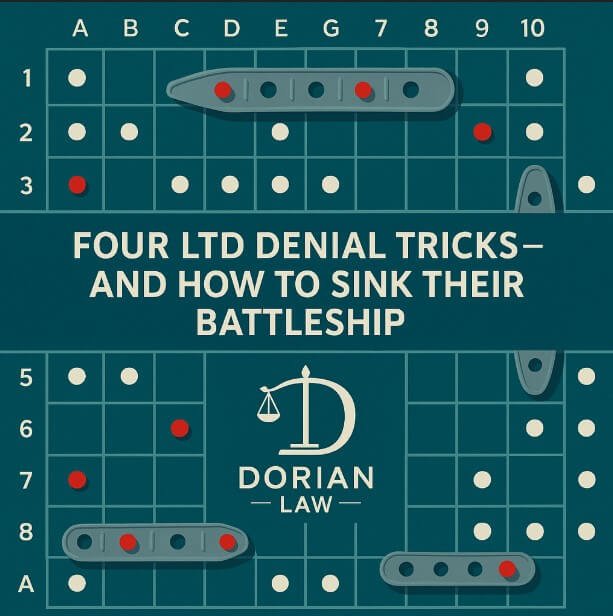Proven. Reliable. Victorious.
“Brent was knowledgeable, thoughtful and had a strategic approach. I will never be able to properly thank Brent enough for helping me reach a positive outcome. Brent was efficient with his time and strategy, unbelievably empathetic and re-assuring. Thank you to Brent....I am forever grateful.”
Welcome to Dorian Law’s blog page. This is where we write about useful tips, emerging trends, and provide thoughtful insights regarding LTD, Life, and AD&D Insurance benefits. Search for something you are interested in or check out a topic from the list below. Whatever brought you here, I hope we can make a difference.
- AI Legal Risks
- AI and Legal Advise
- Abuse of Discretion
- Accidental Death Insurance (AD&D)
- Attorneys' Fees
- Bad Faith
- Best Font for Legal Briefs
- Breach of Fiduciary Duty
- Case Review Corner
- ChatGPT and Insurance
- Cherry-Picking Medical Records
- Costs
- Denied Disability Benefits
- Denied Life Insurance Benefits
- Disability Insurance
- Disability Insurance Company Tactics
- Disability While Working
- Duty to Cooperate
- ERISA
- ERISA Preemption
- ERISA accidental death claims
- ERISA disability claims
- Exhausting Administrative Remedies
- Fibromyalgia
- Footnote Citations
- Hiring an Insurance Lawyer
- Individual Disability
- Interpleader
- LTD Appeal Checklist
- Legal Document Design
- Legal Ethics
- Legal Typography
- Legal Writing Tips
- Life Insurance
- Long Term Disability
- Long Term Disability Insurance
- Long-COVID
- Lupus
- ME/CFS
- MetLife
- Objective Medical Evidence
- Pre-existing Condition
- Provider Reimbursement
- Punitive Damages
- Reliance Standard
- Retroactive Disability Claims
- Sedentary Work
- Severance Agreement
- TBI
- Taxes

Four Long-Term Disability Denial Tricks — And How to Beat Them
Insurers use the same four tricks to cut off long-term disability benefits—blowing ERISA’s appeal deadline, cherry-picking records, invoking a 24-month “self-reported” cap, and pretending your hobby proves employability. Wonsang v. Reliance (4th Cir. 2025) dismantles every tactic. Learn how to leverage that ruling, sink the insurer’s battleship, and turn “No” into “Not so fast.”

Understanding “Abuse of Discretion” in ERISA Long-Term Disability Claims
Can your disability insurance company just make up their own rules?
When long-term disability (LTD) benefits are denied under ERISA, insurers often claim broad discretion. But if they twist or ignore the plan's actual terms, that's an abuse of discretion—one you can challenge. Here’s how it works, what the law says, and what you need to know to fight back.

An Analysis of Unum's Internal Disability Claim Medical Review Process and Associated Litigation
Are you struggling with a denied disability claim from Unum? This analysis reveals common tactics used by Unum, including reliance on 'paper reviews' and challenges to claimant credibility. Explore evidence of Unum's multi-step review process and how it can impact your claim. If you believe Unum has acted in bad faith or violated ERISA, understanding your options for legal action against Unum is critical. Our report provides insights into court cases and regulatory settlements involving Unum disability claim denials.

Case Review Corner: The Shift in Standards - Understanding ERISA's "Any Occupation" Disability Definition
What does it really mean to be unable to perform "Any Occupation" under an ERISA disability plan? We delve into a recent court case that examines this very question and its impact on a claimant's benefits.

Punitive Damages for Breach of the Covenant of Good Faith and Fair Dealing Based on Reckless Disregard in California
In California, insurance companies have a duty to act fairly and honestly with their policyholders. If they don't, it's called "bad faith." Sometimes, if an insurance company acts really badly, they might have to pay extra money called "punitive damages" to punish them and stop them from doing it again. To get punitive damages, the person suing usually has to show the insurance company acted with "malice," meaning they intentionally tried to harm someone or didn't care about their rights, or with "oppression," meaning they were cruel and unjust. Just being careless or "reckless" might not be enough to get punitive damages unless it shows they really didn't care about someone's rights or safety.

